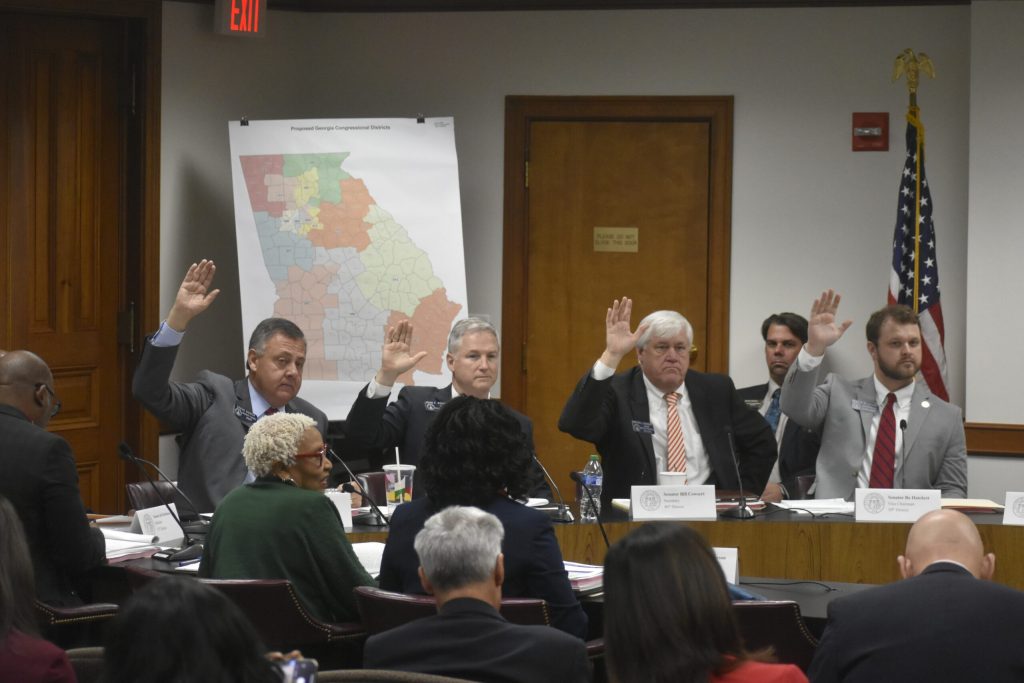Georgia GOP lawmakers advance plan to revamp McBath’s district over Dem objections

Republican Sens. Steeve Gooch, John Kennedy, Bill Cowsert and Bo Hatchett vote to approve new Congressional maps. Ross Williams/Georgia Recorder
Georgia’s new GOP-created Congressional map is teed up for a vote in the Senate after a committee approved it on a party-line vote Monday.
Georgia lawmakers are back in Atlanta working on the maps because a federal judge ruled the maps for the state House and Senate as well as Georgia’s 14 Congressional Districts violated the Voting Rights Act.
U.S. District Judge Steve Jones ruled that the Congressional map should include an additional majority Black district west of Atlanta. The new map has such a district, but Democrats and some good government advocates say there’s a catch.
“It appears that a lot of this is going to come down to how we’re actually going to be defining ‘minority opportunity district’ and whether the assertion that minority opportunity district has to be majority Black, or it can be a coalition district, I think that’s going to be where the debate is going to have to be had,” said Sen. Harold Jones, an Augusta Democrat.
“I think we have eliminated a minority opportunity district, which goes completely against the judge’s order, and that’s one of the principal reasons why I’d be against this particular map,” he added.
The debate comes down to the proposed District 7, which includes Forsyth, Lumpkin and Hall counties as well as parts of north Fulton, east Cherokee and west Hall counties. The current District 7 includes much of Gwinnett County with just a smidge of north Fulton.
Changing the boundaries also changes the racial makeup. The majority of the district’s voting age population is currently made up of people from different minority groups – 27% of them are Black, 21% Hispanic and 15% Asian, and about 33% white.
The proposed map would bring the white voting age population up to just over two thirds while reducing Black voters to 7.7%, Hispanic voters to 9% and Asian voters to 12.4%.
White voters are more likely to support Republican candidates, and Democrats argue the change eliminates a district in which a coalition of minority voters can elect a candidate of their choice and violates Jones’ stipulation that the state cannot solve the problem by “eliminating minority opportunity districts elsewhere in the plans.”
Senate redistricting chair Sen. Shelly Echols, a Gainesville Republican said the map falls within the letter of Judge Jones’ law.
“Judge Jones was clear on page 510 of the order that we cannot eliminate any existing majority opportunity districts in drawing the new majority Black district,” she said. “While he doesn’t define that term, it’s clear he’s referencing existing majority Black districts.”
Thus, eliminating a majority minority district is not in opposition to the order if the district is not majority Black, she said.
“This congressional plan does not eliminate any existing majority Black districts,” she said. “Instead, it takes a district that is not a majority Black district and shifts it north where it remains non-majority Black. To be clear, the Voting Rights Act protects distinct racial groups, not coalitions of voters. District 7 was not a majority Black district on the 2021 plan, and it is not a majority Black district on this plan. So there’s no concern about eliminating a minority opportunity district.”
Ken Lawler, chair of Fair Districts Georgia, a non-partisan redistricting organization, said he has concerns.
“Our issue with the map, and the reason we say it fails the test, is because of the way District 7 has been treated,” he said. “District 7 was a minority opportunity district, in our view. Yes, it was a coalition, but it was a very strong minority coalition at around 67% minority voters. The new map has it up to 33%. So we clearly believe that this is in violation of the spirit of the court.”
Lawler also took issue with a statement Echols made that maintaining the state’s 9-5 partisan balance in favor of Republicans was one of the factors considered in making the map, along with considerations like ensuring equal population across districts, limiting splits among communities of interest and drawing districts that are compact and contiguous.
“Another goal was to ensure the existing partisan balance of the Congressional plan remains the same, so we maintain continuity of representation as much as possible,” she said. “To do that, we utilized election return data from 2018, 2020, and 2022 that had been allocated on the plan to understand the partisan impact of this plan, which retains the same political balance as it was in 2021.”
Before 2021, Georgia’s partisan balance was 8-6 in favor of the GOP. But in that year’s redistricting cycle, Republicans drew her district to be friendlier to a conservative. McBath challenged and defeated fellow Democratic Congresswoman Carolyn Bourdeaux for control of the 7th District, where she now finds herself a target once more.
McBath has said she will wait for Jones to weigh in before announcing her plans for the next election.
Congressional Republicans have plenty of incentive to shore up their seats in Georgia, said University of Georgia political science professor Charles Bullock.
“If they figure they lost the Santos seat, and they may lose a seat over in Alabama, and you lose a seat in Georgia, and everything else remains constant, then that narrow majority’s slipping away,” he said.
But, if they push past Jones’ limit, they could regret it. If Jones is not satisfied with the map, he could appoint an expert to redraw it without prejudice toward partisan balance or protecting incumbents. That could mean Democrats pick up a seat or incumbent lawmakers get paired in the same district.
“I think there is quite a risk here for Republicans, at least as I read Judge Jones’ opinion,” Bullock said. “They’re going to have arguments that will be made on both sides. They’ve sketched out here what the arguments are going to be on both sides. Republicans will say ‘Hey, we did what you wanted in the new majority Black district.’ Democrats will say ‘Yes, but they didn’t listen to the other part of your directive.’”
Even if Jones likes what he sees, Republicans are hoping for the success of an appeal of his ruling, which could let them reinstate the maps they passed in 2021.
SUPPORT NEWS YOU TRUST.
The post Georgia GOP lawmakers advance plan to revamp McBath’s district over Dem objections appeared first on Georgia Recorder.



